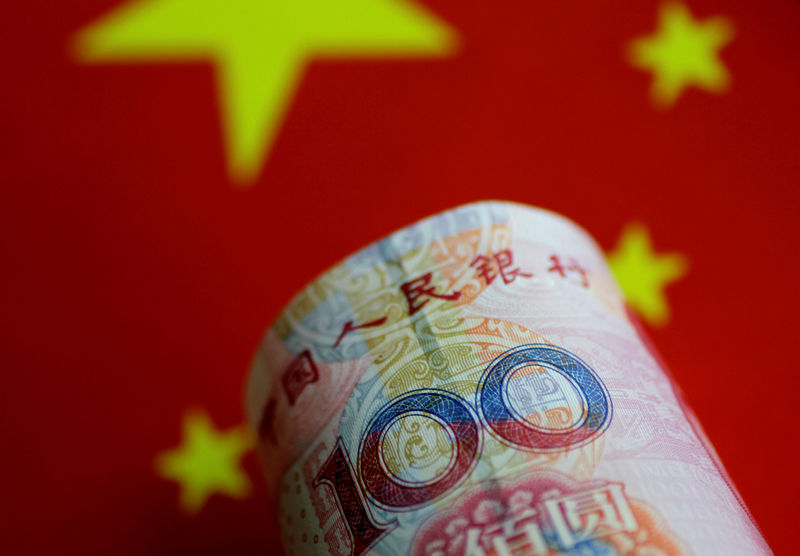BEIJING (Reuters) - New bank lending in China likely slowed in July, a Reuters poll showed, reinforcing expectations that policymakers will need to announce more support measures in coming months to stabilize the cooling economy as U.S. trade pressure builds.
The rapidly worsening trade dispute, rising borrowing costs, and this week's sudden drop in the yuan have fanned worries that the world's second-largest economy could face a sharper slowdown.
But policymakers are also increasingly worried about rising debt and financial risks, particularly in the property market.
Chinese banks likely extended 1.25 trillion yuan ($177.39 billion) in net new yuan loans last month, down from 1.66 trillion yuan in June and below 1.45 trillion yuan in July 2018, according to a median estimate in a Reuters survey of 28 economists.
Lending typically slows in China in July before picking up again in August.
Broad M2 supply was seen dipping marginally to 8.4% year-on-year, from 8.5% in June. Annual growth of outstanding loans was seen edging down to 12.8% from June's 13.0%.
The People's Bank of China (PBOC) has been pressing lenders for over a year to extend more help to cash-strapped companies and offer more medium- to long-term loans to the manufacturing sector. But banks are reluctant to lend to private sector firms due to the uncertain business outlook and rising defaults.
Economists at ANZ estimated last week that only 24% of bank loans in June were related to investments in real economic activity, down from 55% in January, with property and "zombie" companies still taking up a large share of available funds.
Many smaller firms are also in no mood to borrow as domestic and export orders falter and profit margins are squeezed by rising costs. Economic growth cooled to a 27-year low in the second quarter.
July also saw renewed worries over bad debts at China's smaller banks, after regulators sought to restructure the troubled Bank of Jinzhou (HK:0416) due to liquidity problems. However, there were no reported spikes in short-term borrowing costs or interbank funding crunches like those which occurred in late May and June after regulators took over Baoshang Bank.
LOTS OF SUPPORT OPTIONS
Analysts expect total social financing (TSF), a broad measure of credit and liquidity in the economy, to fall to 1.5 trillion yuan in July from 2.26 trillion in June.
TSF includes off-balance sheet forms of financing that exist outside the conventional bank lending system, such as initial public offerings, loans from trust companies and bond sales.
China has allowed local governments to issue more debt this year as part of a plan to accelerate infrastructure spending and stoke domestic demand.
But local governments are already close to exhausting their annual bond quotas and special bond issuance dropped back last month as a result, Capital Economics said in a note.
Equity issuance, however, likely strengthened last month as the first batch of companies listed on China's new Nasdaq-style STAR stock market, it added.
Sources told Reuters recently that China is keeping all of its economic policy tools with reach as the trade war with the United States gets longer and costlier, but still see more aggressive action such as interest rate cuts as a last resort if the dispute gets even worse.
Highlighting debt concerns, the Politburo, a top decision-making body of the Communist Party, took the unusual step last month of announcing it would not use the property market as a form of short-term stimulus.
But analysts say continued support is needed, especially after a month-long trade truce with the United States was shattered last week, when President Donald Trump vowed to impose a 10% tariff on $300 billion of Chinese imports from Sept. 1. The move would extend levies to effectively all of the goods China exports to the United States.
To free up more funds for lending and accommodate local government project financing, most analysts still expect the central bank will cut banks' reserve requirement ratios (RRR) further in coming months, on top of six reductions since early 2018.
"We expect more liquidity offering by the PBOC, including 100 bps RRR cut by end 2019, which can help lower market interest rates, but we still do not expect any benchmark rate cut," economists at UBS said.
They also expect more funding support for infrastructure to help boost infrastructure investment in the second half of this year.
A few analysts also expect cuts in short-term or money market rates if growth continues to weaken, especially if the U.S. Federal Reserve eases policy further. The People's Bank of China does not always follow Fed moves, however, and left rates unchanged when U.S. benchmark rates were cut late last month.
